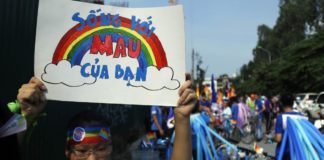
William “Bill” Koelsch, a former professor at Clark University and trailblazing LGBTQ rights activist, passed away Nov. 5. He was 89.
Koelsch, sometimes known by his pseudonym, A. Nolder Gay, is survived by his partner of 50 years, Joseph Dennison, who said he hoped the educator, writer and activist was not only remembered for his work, but for being a mild and kind person.
“He could be stubborn, but he was never stubborn to me,” Dennison, 74, said. “He always did for me the things he could do.”
The pair met in the 1970s in Boston and had been together since. They had built many memories over that time, but the trips they took to Rome and Assisi in Italy and Oxford in England were particular favorites for Dennison.
“I was Catholic and Bill wasn’t, but he always wanted to bring me to places that were important,” Dennison said.
When Koelsch was conducting research at the University of Oxford, Dennison said, they were able to visit London and Canterbury.
“He always brought me to good places,” he said.
A self-described “country boy,” Koelsch would leave the military in the late 1950s to return to academia. He received a bachelor’s degree from Bucknell University in 1955, and his master’s degree from Clark University in 1959.
In 1962, he moved to Boston to conduct research for his doctoral dissertation in American history and would eventually receive his Ph.D. in American history from the University of Chicago in 1966.
Shortly after, in 1967, he was hired as an assistant professor of history and geography at Clark, where he would soon became a tenured professor.
While at Clark, Koelsch focused on the history of geography and higher education, and eventually wrote about the history of the university in “Clark University: A Narrative History, 1887-1987.”
He would also have a major impact on higher education, not only at Clark, but throughout New England.
In 1975, he became one of the first educators to teach a course on the gay liberation movement. In 1982, after seeing the impact of the AIDS epidemic, Koelsch would, again, be among the first to incorporate lessons about AIDS into his course at Clark, Health and Disease in the American Habitat.
Clark professor Rinku Roy Chowdhury, who took a course with Koelsch when she was pursuing her Ph.D., said it proved intimidating for her, since she studied computer science in her undergraduate education and ecology for her graduate education.
But Koelsch was “incredibly welcoming” to her and her cohort of Ph.D. candidates and was able to put them all at ease by making them all feel like they belonged in the program, she said.
“It was a great space for us to really … establish rapport and camaraderie, not just with the professor, but with each other,” Chowdhury said. “He just created this extremely welcoming and fun space in a really, really intense Ph.D. program and department.”
In an interview with Clark University, Koelsch said “the beginning of my search for a positive gay life” came after hearing a fellow military officer mention a magazine for the community called ONE.
“That, and a couple of other magazines … were the first positive writings by and for gay men that I’d ever seen,” he said.
In 1973, Koelsch took a sabbatical and moved to Boston, where he met Dennison and became involved with the gay rights movement. It was during this time that he began writing a column under the pseudonym A. Nolder Gay for Gay Community News (GCN) newspaper.
He would continue writing for different publications ‒ including Esplanade, Integrity Forum and Bay Windows ‒ for the next 15 years.
His activism was not limited to writing columns. Koelsch began attending services with gay-supportive religious groups, got involved with the Massachusetts Gay Political Caucus, and performed community activism.
By 1978, Koelsch took his best work from GCN and Esplanade and published a book titled “The View from the Closet: Essays on Gay Life and Liberation.” He would do something similar in 1990, when he compiled this best work in “Some of My Best Friends: Essays in Gay History and Biography.”
He became a member of the Province I (New England) Episcopal AIDS Network, served as a chair of the AIDS Task Force of his diocese, served on the Worcester Ecumenical Council’s AIDS Committee, and volunteered for the NAMES Project’s AIDS Memorial Quilt displays both locally and nationally. He also continued speaking with religious groups, taking time to discuss HIV/AIDS with them.
Koelsch would go on to work at Clark as a professor until his retirement in 1998. Even after retirement, Koelsch continued his scholarly writing, going on to write more than 20 professional articles and review essays. He also wrote the book “Geography and the Classical World: Unearthing Historical Geography’s Forgotten Past.”
He would eventually move with Dennison to San Diego, where he would live out the rest of his life. Koelsch is buried at St. Paul’s Cathedral in San Diego where, eventually, Dennison will also be buried next to his partner.
Chowdhury said that when she thinks of Koelsch, she thinks of his laugh and humor, and his ability to make people feel comfortable around him.
“I think that he was just a kind and gracious man, in addition to, of course, being a wonderful scholar and activist,” she said.







